2 Taylor Bacon
Narrative Summary
Ajla Trnjanin left her country of origin, Bosnia, when she was only five months old. Her parents left Bosnia for Croatia where they stayed with friends for five months before leaving for the United States in April of 1999 when Ajla was ten months old. At the time of Ajla’s migration, she was an only child who resettled to the United States with just her 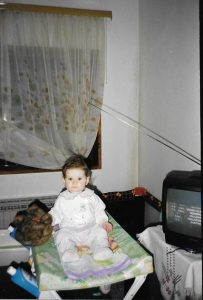 parents. Her family was relocated to Ankeny, Iowa a suburb outside of Des Moines. Since their migration, they have remained in the Des Moines area. Due to the fact that Ajla was only ten months when she moved to the United States, she asked her parents some of the interview questions prior to the interview to get their opinions and answers on some of the questions. One of the questions Ajla’s parents answered was what life was like for them before moving to America. They described life in Bosnia with positive words, they loved living there and enjoyed their quality of life, they felt very comfortable there before the conflict. Ajla’s parents met each other in Germany, where they were both living during the time of war in Bosnia. Her parents then moved back to Bosnia together when
parents. Her family was relocated to Ankeny, Iowa a suburb outside of Des Moines. Since their migration, they have remained in the Des Moines area. Due to the fact that Ajla was only ten months when she moved to the United States, she asked her parents some of the interview questions prior to the interview to get their opinions and answers on some of the questions. One of the questions Ajla’s parents answered was what life was like for them before moving to America. They described life in Bosnia with positive words, they loved living there and enjoyed their quality of life, they felt very comfortable there before the conflict. Ajla’s parents met each other in Germany, where they were both living during the time of war in Bosnia. Her parents then moved back to Bosnia together when 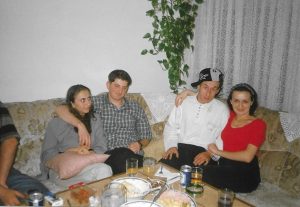 things began to settle down. Ajla asked them what they missed most about life before migrating to the United States and they expressed how easy and simple life was in Bosnia compared to the hustle and fast-paced environment of the United States. They enjoyed how natural Bosnia was, how individuals would use what they had and walking everywhere was more common and accessible than what they experienced on arrival. When Ajla was born her parents realized that in order to give her a safe and stable life free of conflict they would need to leave Bosnia. I then asked if Ajla or her parents ever planned on returning to live in Bosnia, Ajla answered that her parents have planned to move back to Bosnia once they retire and live out their lives there. I then asked her to describe the day she left to resettle in the U.S. she used words such as sad, emotional, excited, and scared. Her parents felt a
things began to settle down. Ajla asked them what they missed most about life before migrating to the United States and they expressed how easy and simple life was in Bosnia compared to the hustle and fast-paced environment of the United States. They enjoyed how natural Bosnia was, how individuals would use what they had and walking everywhere was more common and accessible than what they experienced on arrival. When Ajla was born her parents realized that in order to give her a safe and stable life free of conflict they would need to leave Bosnia. I then asked if Ajla or her parents ever planned on returning to live in Bosnia, Ajla answered that her parents have planned to move back to Bosnia once they retire and live out their lives there. I then asked her to describe the day she left to resettle in the U.S. she used words such as sad, emotional, excited, and scared. Her parents felt a 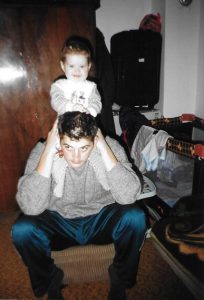 flutter of different emotions as they left Bosnia to begin a new life in America. They left behind Ajla’s grandparents on her father’s side which was difficult for them. Ajla traveled with a red bandana that her grandmother that was staying in Bosnia had given to her, she still has this heirloom today and values it greatly. Her parents had one relative that was already in the U.S. when they relocated, her aunt on her father’s side had already resettled in the Des Moines area and helped make adjusting easier. Once they arrived they quickly were in contact with their refugee resettlement agency that aided them in setting up medical coverage and social security. Her parents both began jobs, her father’s first job was working at DeeZee manufacturing, he then worked with a local insurance company, and he then began his current job in telecommunications for the state after receiving his associates at Des Moines Area Community College (DMACC). Ajla’s mother started working at a daycare and has been at the same daycare since her migration to the states in 1999. We then discussed how she enjoyed growing up in the U.S. and what life was like for her growing up. Ajla loves that she was not born in the U.S. she values that
flutter of different emotions as they left Bosnia to begin a new life in America. They left behind Ajla’s grandparents on her father’s side which was difficult for them. Ajla traveled with a red bandana that her grandmother that was staying in Bosnia had given to her, she still has this heirloom today and values it greatly. Her parents had one relative that was already in the U.S. when they relocated, her aunt on her father’s side had already resettled in the Des Moines area and helped make adjusting easier. Once they arrived they quickly were in contact with their refugee resettlement agency that aided them in setting up medical coverage and social security. Her parents both began jobs, her father’s first job was working at DeeZee manufacturing, he then worked with a local insurance company, and he then began his current job in telecommunications for the state after receiving his associates at Des Moines Area Community College (DMACC). Ajla’s mother started working at a daycare and has been at the same daycare since her migration to the states in 1999. We then discussed how she enjoyed growing up in the U.S. and what life was like for her growing up. Ajla loves that she was not born in the U.S. she values that 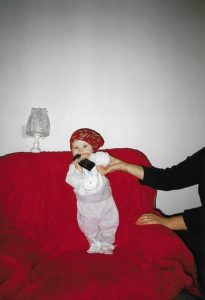 it makes her different, she also appreciates being apart of two cultural communities. She believes that being a refugee has made her more open-minded to others and different situations and is thankful to have the opportunity to experience and connect with more than just one culture. Ajla still has relatives in Bosnia and every other summer she and her family try and go back and visit. It is also important to Ajla’s father that she connects to her culture and continues to learn about her background. When asked about the past conflict that her family had migrated away from Ajla described how her visits to Bosnia remind her every day that she is there of the abuse people experienced by certain areas of Bosnia that have yet to recover or rebuild since the times of war. Her mother was resentful of the abuses that people endured and the ethnic cleansing that killed many innocent people, but Ajla’s mother has come to terms with the fact that nothing can be changed and that moving forward is the only option. Today Ajla is a student at Grandview University in Des Moines,
it makes her different, she also appreciates being apart of two cultural communities. She believes that being a refugee has made her more open-minded to others and different situations and is thankful to have the opportunity to experience and connect with more than just one culture. Ajla still has relatives in Bosnia and every other summer she and her family try and go back and visit. It is also important to Ajla’s father that she connects to her culture and continues to learn about her background. When asked about the past conflict that her family had migrated away from Ajla described how her visits to Bosnia remind her every day that she is there of the abuse people experienced by certain areas of Bosnia that have yet to recover or rebuild since the times of war. Her mother was resentful of the abuses that people endured and the ethnic cleansing that killed many innocent people, but Ajla’s mother has come to terms with the fact that nothing can be changed and that moving forward is the only option. Today Ajla is a student at Grandview University in Des Moines,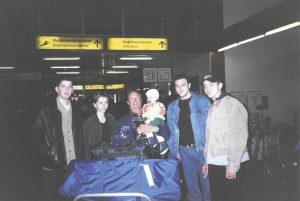 Iowa, where she is studying nursing with an emphasis in psychology. Ajla plans to become a psychiatric nurse practitioner. She values her trips to Bosnia with her family and skypes her grandparents that live in Bosnia every week. My final question for Ajla was what she wants people to take away from her story and the conflict that made her and her family leave Bosnia. She first said how thankful she was for her family’s experience during the conflict because she knows that others had a much harder time. Next, she mentioned the importance of how information can be skewed and that it is best to hear information from people who have lived through the conflict and to not always believe those who claim that the conflict “was not their fault”. Ajla said that it is easy to read information on the internet but it is even more valuable to talk to the people who experienced the mistreatment first hand. Her final suggestion for others was to remember that not everything is black and white and to keep your mind open to other people’s experiences and stories of what got them to the place they are today.
Iowa, where she is studying nursing with an emphasis in psychology. Ajla plans to become a psychiatric nurse practitioner. She values her trips to Bosnia with her family and skypes her grandparents that live in Bosnia every week. My final question for Ajla was what she wants people to take away from her story and the conflict that made her and her family leave Bosnia. She first said how thankful she was for her family’s experience during the conflict because she knows that others had a much harder time. Next, she mentioned the importance of how information can be skewed and that it is best to hear information from people who have lived through the conflict and to not always believe those who claim that the conflict “was not their fault”. Ajla said that it is easy to read information on the internet but it is even more valuable to talk to the people who experienced the mistreatment first hand. Her final suggestion for others was to remember that not everything is black and white and to keep your mind open to other people’s experiences and stories of what got them to the place they are today.
Personal Reflection
I know Ajla from going to school in Ankeny, there are two high schools and she went to North Ankeny and I went to South Ankeny High school. We had mutual friends but had never officially met in person until I interviewed her for this assignment. I genuinely enjoyed learning about Ajla’s history of migrating and growing up in the United States. Her outgoing nature made the interview process fun and relaxed as she told me her story of 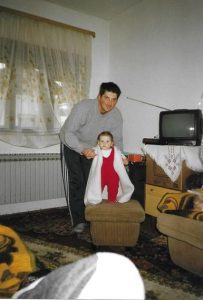 coming to the U.S. with her parents. Ajla was so young when she migrated here, being only ten months, so she had asked her parents some of the questions I had sent to her ahead of time. This was helpful to me because I was told the story of Ajla growing up in the U.S. as a refugee and the story of what Ajla’s parents had told her of their recollection of resettling in Iowa. Hearing Ajla recount what her parents had told her of their journey was so interesting, the way she told me her parents’ answers to the questions was a little guarded but it seemed in a way that her hesitancy was a way to make sure she told her parent’s story correctly and did not take their voice from them. As she spoke I could hear how proud she was to identify both with being Bosnian and American. She expressed her love for Bosnian music telling me a story about going to a music festival in Bosnia on her last visit there. She also described how important it was to her parents for her to be involved and educated on her culture. Something that significantly stood out to me from my interview with Ajla was her story about her mother blessing her car, Ajla recently purchased a new car at the time of our interview and she told me about how her mother had prayed on Tesbih beads for Ajla to hang in her car. I loved the way she described this story to me, I saw her love and admiration for her mother and could hear a cheerful laugh in her voice as she recalled her mom giving her the Tesbih beads. This was significant to me because I enjoyed learning a piece of Ajla’s culture that was important to her and her family. The next significant fact Ajla mentioned was her appreciation of having dual citizenship in both the United States and in Bosnia, her brother
coming to the U.S. with her parents. Ajla was so young when she migrated here, being only ten months, so she had asked her parents some of the questions I had sent to her ahead of time. This was helpful to me because I was told the story of Ajla growing up in the U.S. as a refugee and the story of what Ajla’s parents had told her of their recollection of resettling in Iowa. Hearing Ajla recount what her parents had told her of their journey was so interesting, the way she told me her parents’ answers to the questions was a little guarded but it seemed in a way that her hesitancy was a way to make sure she told her parent’s story correctly and did not take their voice from them. As she spoke I could hear how proud she was to identify both with being Bosnian and American. She expressed her love for Bosnian music telling me a story about going to a music festival in Bosnia on her last visit there. She also described how important it was to her parents for her to be involved and educated on her culture. Something that significantly stood out to me from my interview with Ajla was her story about her mother blessing her car, Ajla recently purchased a new car at the time of our interview and she told me about how her mother had prayed on Tesbih beads for Ajla to hang in her car. I loved the way she described this story to me, I saw her love and admiration for her mother and could hear a cheerful laugh in her voice as she recalled her mom giving her the Tesbih beads. This was significant to me because I enjoyed learning a piece of Ajla’s culture that was important to her and her family. The next significant fact Ajla mentioned was her appreciation of having dual citizenship in both the United States and in Bosnia, her brother 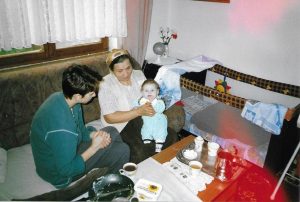 who is currently seventeen is only a citizen in the U.S. and she described how they had a long process of getting her brother his citizenship in Bosnia. I found this interesting because I am sure the process of getting citizenship in Bosnia is different than obtaining U.S. citizenship. The final fact I enjoyed learning about Ajla was how she talked about her grandmothers. First, she expressed her love for the red bandana that her grandmother who had remained in Bosnia had given her and how it is still tucked away in her closet for safekeeping. Second, she described how her grandmother who had traveled to the U.S. after they had, had kept nearly everything given to her from the refugee process from the bag given to her at the airport labeled “personal belongings” to the wet nap she was given on the plane ride to the United States. Ajla’s love for her heritage, journey, and family was evident the entire time I interviewed her and I am so grateful I was given the opportunity to learn more about her.
who is currently seventeen is only a citizen in the U.S. and she described how they had a long process of getting her brother his citizenship in Bosnia. I found this interesting because I am sure the process of getting citizenship in Bosnia is different than obtaining U.S. citizenship. The final fact I enjoyed learning about Ajla was how she talked about her grandmothers. First, she expressed her love for the red bandana that her grandmother who had remained in Bosnia had given her and how it is still tucked away in her closet for safekeeping. Second, she described how her grandmother who had traveled to the U.S. after they had, had kept nearly everything given to her from the refugee process from the bag given to her at the airport labeled “personal belongings” to the wet nap she was given on the plane ride to the United States. Ajla’s love for her heritage, journey, and family was evident the entire time I interviewed her and I am so grateful I was given the opportunity to learn more about her.
